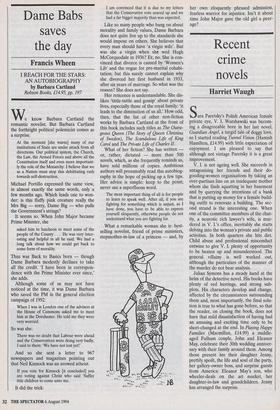Dame Babs saves the day
Francis Wheen
I REACH FOR THE STARS: AN AUTOBIOGRAPHY by Barbara Cartland Robson Books, f14.95, pp. 197 We know Barbara Cartland the romantic novelist. But Barbara Cartland the forthright political polemicist comes as a surprise.
At the moment [she warns] many of our institutions of State are under attack from all directions. Our political system, the Church, the Law, the Armed Forces and above all the Constitution itself and even more important- ly the role of the Monarchy. I believe that we as a Nation must stop this debilitating rush towards self-destruction.
Michael Partin° expressed the same view, in almost exactly the same words, only a few months ago. Which leads one to won- der: is this fluffy pink creature really the Mrs Big — sorry, Dame Big — who pulls the Government's strings?
It seems so. When John Major became Prime Minister, she
asked him to luncheon to meet some of the people of the County . . He was very inter- esting and helpful in all he said. We had a long talk about how we could get back to some form of morality.
Thus was Back to Basics born — though Dame Barbara modestly declines to take all the credit. 'I have been in correspon- dence with the Prime Minister ever since,' she adds.
Although some of us may not have noticed at the time, it was Dame Barbara who saved the PM in the general election campaign of 1992:
When I was in London one of the advisers at the House of Commons asked me to meet him at the Dorchester. He told me they were very worried.
So was she: There was no doubt that Labour were ahead and the Conservatives were doing very badly. I said to them: 'We have not lost yet!'
And so she sent a letter to 967 newspapers and magazines pointing out that Neil Kinnock was an avowed atheist.
If you vote for Kinnock [it concluded] you are voting against Christ who said 'Suffer ittle children to come unto me.
It did the trick:
I am convinced that it is due to my letters that the Conservative vote soared up and we had a far bigger majority than was expected.
Like so many people who bang on about morality and family values, Dame Barbara does not quite live up to the standards she would impose on others. She believes that every man should have 'a virgin wife'. But was she a virgin when she wed Hugh McCorquodale in 1936? Er, no. She is con- vinced that divorce is caused by Women's Lib' and the vogue for pre-marital cohabi- tation; but this surely cannot explain why she divorced her first husband in 1933, after six years of marriage. So what was the reason? She does not say.
Her reticence is understandable. She dis- likes little-tattle and gossip' about private lives, especially those of the royal family: 'it leads to the diminution of us all.' How odd, then, that the list of other non-fiction works by Barbara Cartland at the front of this book includes such titles as The Outra- geous Queen (The Story of Queen Christina of Sweden), The Scandalous Life of King Carol and The Private Life of Charles II.
What of her fiction? She has written or, rather, dictated — more than 500 novels, which, as she frequently reminds us, have sold millions of copies. Ambitious authors will presumably read this autobiog- raphy in the hope of picking up a few tips. Her advice is simple: keep to the point; never use a superfluous word.
The most important thing of all is for people to learn to speak well. After all, if you are fighting for something which is unjust, as I have done, you have to be able to express yourself eloquently, otherwise people do not understand what you are fighting for.
What a remarkable woman she is: best- selling novelist, friend of prime ministers, stepmother-in-law of a princess — and, by her own eloquently phrased admission, fearless warrior for injustice. Isn't it about time John Major gave the old girl a peer- age?


















































 Previous page
Previous page